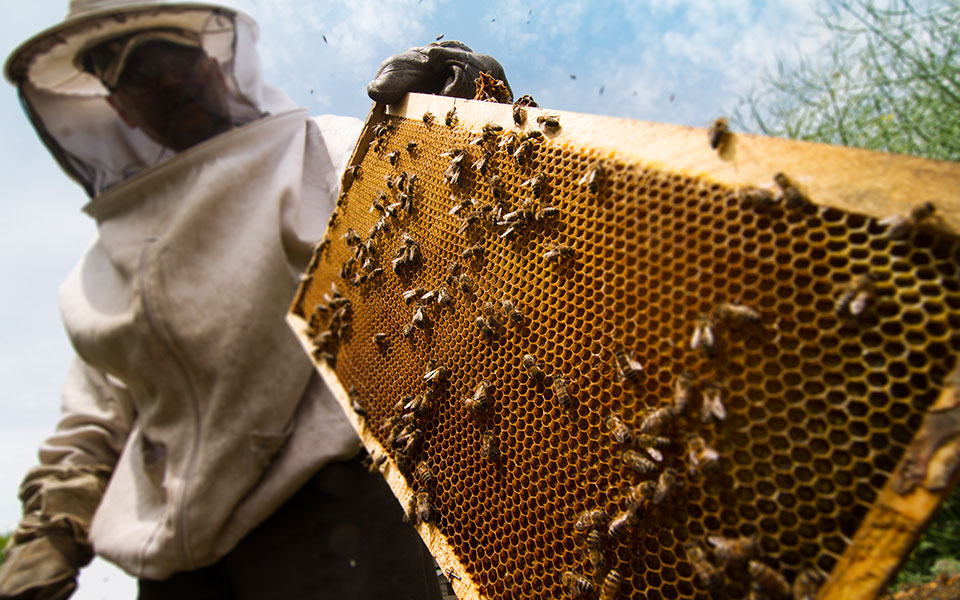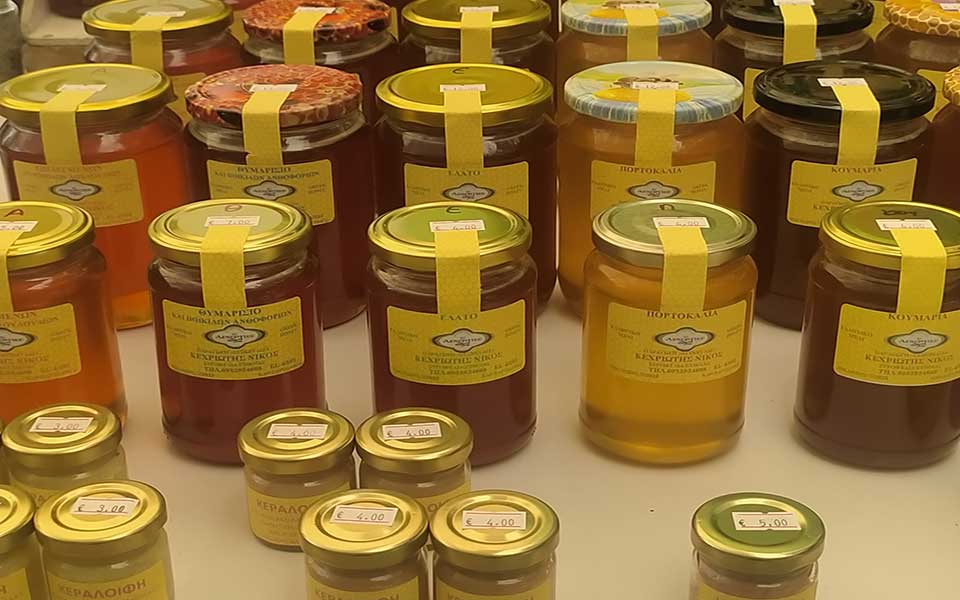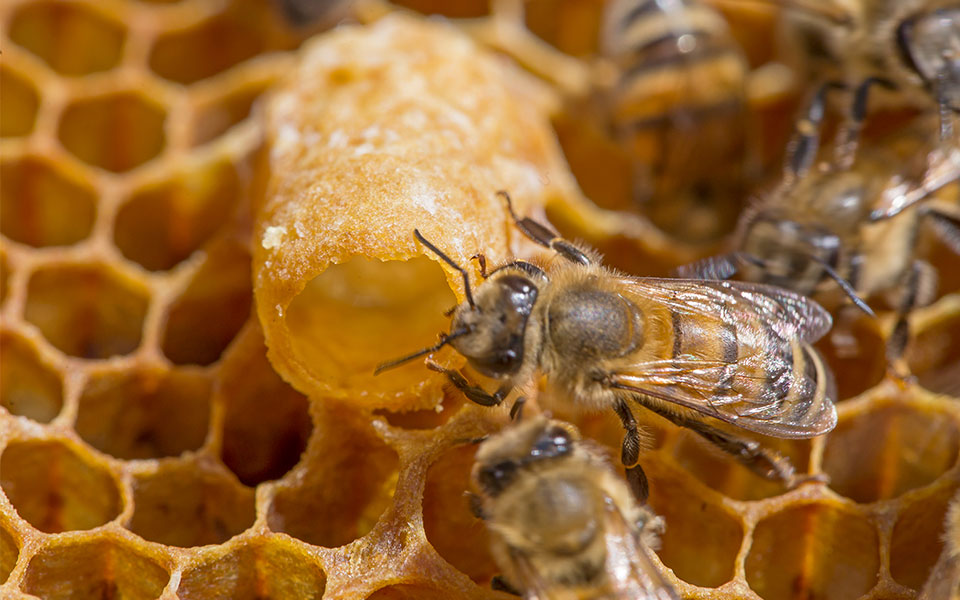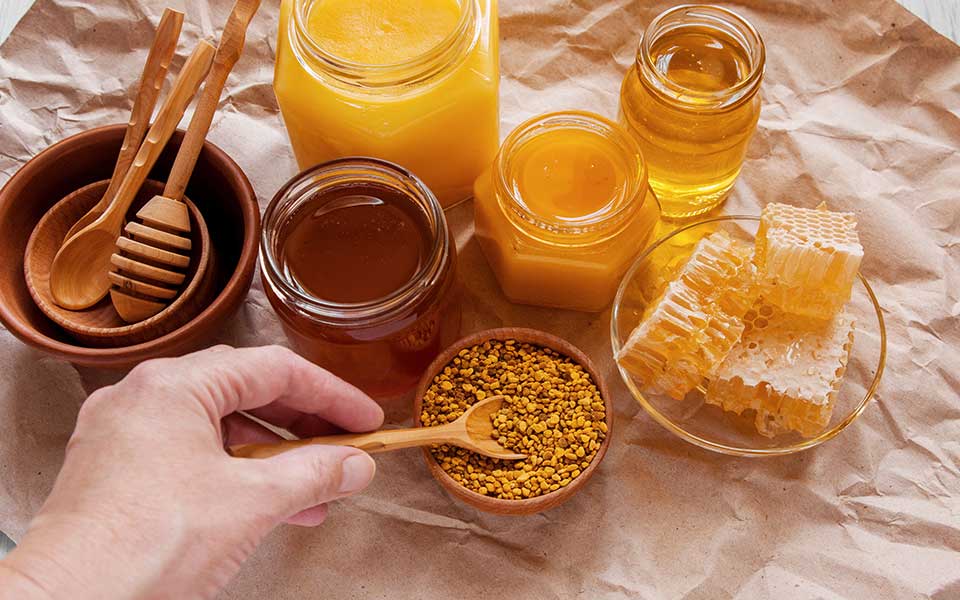Honey and bee products have been part of Greek culture for millennia, used both as food and as medicine. Today, one can find an incredible range of high quality Greek bee products, from raw materials such as pollen, royal jelly, honey and honeycomb to the sophisticated supplements, foods and cosmetics that are produced from them.
From pricey honey made with gold leaf to the “homemade” style products sold by beekeepers at the local laiki street market, the availability of these sweet and highly nutritious products is one of the blessings of life in Greece. Here we take a look at the key health benefits of natural bee products:
Honey (Meli)
Let’s get the bad news out of the way first. Although completely fat-free, honey is essentially pure sugar and thus high in calories. However, unlike sugar, it offers numerous health benefits recognized the world over since ancient times and tastes delicious to boot.
Fresh, unheated and minimally processed honey is the optimal choice and contains the highest concentration of antioxidants. These compounds are thought to help increase levels of adiponectin, an inflammation-lowering hormone that helps regulate the blood. Several studies have also shown that honey can have protective benefits for the heart, lowering blood pressure and preventing oxidative stress.
Since antiquity, Greeks and Egyptians have used honey for its strong antibacterial and anti-inflammatory healing effects when applied to wounds and burns directly on the skin, or for treating respiratory ailments like coughs and congestion when added to a tea.
Honey has many cosmetic benefits too, and is widely used in shampoo, soap, lip balm and face cream. For a DIY skin-brightening and nutritive facemask, mix one teaspoon of honey with a few drops of olive oil and lemon and apply the mixture to the skin for 15 minutes before rinsing it off with warm water.

© Shutterstock
Pollen (Gíri)
Not as popular as honey yet abundant in numerous health-boosting compounds, especially the variety gathered during springtime, fruity-tasting bee pollen contains over 250 active substances. Flavonoids, quercetin, carotenoids, and glutathione are just some of the many free-radical-fighting antioxidants that pollen is loaded with.
Among the multitude of health claims surrounding bee pollen consumption (one tablespoon per day for adults and half to one teaspoon for kids per day is believed to suffice) are those that it can help prevent cancer, lower the risk of heart disease and even protect the liver from toxic substances.
The potent antimicrobial qualities of pollen are also thought to aid wound healing and boost general immunity, while it is also believed to help diminish some menopausal symptoms such as hot flushes and night sweats. Bee pollen is easy to add to your diet – sprinkle it into a salad, smoothie or yogurt with honey.

© Alexia Amvrazi
Honeycomb (Kiríthra)
Eating the bee’s “home,” which is made up of hexagonal beeswax cells filled with raw honey, is thought to be highly beneficial. Beeswax, which can be chewed like a gum and swallowed, is believed to be rich in healthy fatty acids that help reduce high blood cholesterol levels, thus contributing to heart health. It also has strong antibacterial and anti-fungal qualities. Look for fresh honeycomb, which will have softer beeswax and is easier to swallow.
Beeswax is also rich in vitamin A, which helps bolster eyesight and can help the skin heal while preventing infection and inflammation, which is why this ingredient is often used in lip balms and face creams.
Eating one teaspoon per day of honeycomb is thought to be a great way to keep the immune system strong and prevent common colds, respiratory infections, liver toxicity and heart disease.

© Shutterstock
Royal Jelly (Vasilikos Poltos)
Like honey and pollen, royal jelly, a white and creamy, sharp-tasting substance that’s ideally consumed in a tiny daily quantity (half a teaspoon for adults and a quarter of a teaspoon for children on an empty stomach is the recommended dose) has strong antioxidant compounds, and has been shown to have antibacterial and anti-inflammatory properties.
Used by Cleopatra in her cosmetics, by the Chinese as an aphrodisiac, fertility and antiaging medicine, and by the ancient Greeks as a daily tonic for mind and body (Pythagoras was a big fan), the “queen bee’s nourishment” is rich in vitamins, minerals and protein. Not only does it boost energy levels, it’s widely believed to provide protection from disease, including cancers, heart and blood problems.
Several studies also indicated that royal jelly helps regulate hormones and is especially beneficial for women going through menopause, as well as women who suffer strong period pains. Children too are thought to benefit from taking royal jelly, which can help protect their bodies from colds and flus, respiratory ailments and anemia.
Beeswax balm (Keralifi)
When shopping from your honey seller at the local farmer’s market or visiting a pharmacy where they sell “homemade”-style products, buy a jar of keralifi, which will always come in handy.
Made using natural, pure beeswax, olive oil and essential oils, this balm has immediate soothing qualities for bruises, grazes and chapped or sore skin. Balms made with essential oils like eucalyptus can also be great for rubbing onto the chest if you have a cough.












